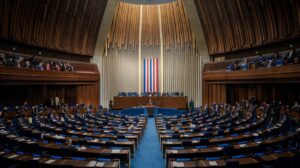Modi snubbed Trump’s Nobel attempt when, during a June 17 phone call, Prime Minister Narendra Modi pushed back on President Trump’s claim that he had mediated a ceasefire in Kashmir and subtly sought India’s support for a Nobel Peace Prize bid. That exchange not only stalled a once-warm relationship but also set the stage for one of the most dramatic downturns in India–US ties in recent memory. This refusal triggered a chain reaction—unfolding as punitive 50% tariffs, disrupted trade talks, visa clampdowns, and a deep cooling of diplomacy that remains unresolved.
Evolution of the Diplomatic Rift
A Turning Point During a June Call
In mid-June, on a 35-minute call, Trump congratulated himself for supposedly brokering peace between India and Pakistan—claiming Pakistan would even nominate him for the Nobel Peace Prize—and subtly hinted that Modi should do likewise. Modi countered that the ceasefire was the result of a direct agreement between India and Pakistan, with no U.S. mediation. The pushback left Trump frustrated, and attempts to negotiate or salvage the moment quickly collapsed.
Tariff Escalation and Trade Fallout
Within weeks, Trump imposed a sweeping 25% tariff on Indian goods—later beefed up by an additional 25% penalty tied to India’s purchase of Russian oil—bringing the total to a staggering 50%. Key export sectors such as textiles, gems, shrimp, and leather bore the brunt of the blow. Sources describe these tariffs not just as economic retaliation, but as symbolic punishment following India’s stance.
Visa Restrictions and Diplomatic Chill
The tariff move was just one part of a broader diplomatic strain. The U.S. administration also tightened student visa rules, cracked down on H-1B workers, and deported undocumented Indians—moves Indian officials likened to “bullying.”
A Breakdown in Communication
Since June 17, Modi and Trump have reportedly not spoken. Multiple calls from Trump went unanswered—some reports even indicate Modi declined four separate invites—highlighting a meaningful breakdown in diplomatic communication.
Wider Strategic Implications
Strains Beyond Bilateral Trade
Beyond trade, the rift undermines broader cooperation. Concerns arise around defense procurement and India’s participation in the Quad alliance, with possible long-term shifts toward China, Russia, and BRICS signaling a more multipolar tilt.
Global Commentary and Long-Term Concerns
Experts warn that the U.S.’s aggressive tariff policy may backfire strategically—jeopardizing trust that took decades to build and pushing India into other geopolitical spheres. Economist Jeffrey Sachs cautioned these actions could isolate the U.S., while analysts described the episode as possibly the most serious rupture in U.S.–India relations in years. The Washington Post
Moving Forward: What Lies Ahead
Both sides now face mounting domestic and diplomatic pressure. India, defending its energy sovereignty, is unlikely to soften; the U.S., meanwhile, risks undermining a key strategic partner. With no resolution yet in sight, rebuilding trust—and revisiting stalled negotiations—will take time and cautious diplomacy.
Conclusion
The June 17 phone call marks a pivotal moment when personal pride, miscommunication, and clashing narratives converged—turning a warm “bromance” into a strategic standoff. Modi’s firm refusal of Trump’s Nobel overture set off a chain reaction that reshaped the trajectory of India–U.S. relations, from tariffs and visa shocks to frozen communication. As the dust settles, both governments must reassess priorities and re-engage thoughtfully. Only time will tell if this fractured alliance can be rebuilt—or if a more competitive multipolar world will define the road ahead.
Subscribe to trusted news sites like USnewsSphere.com for continuous updates.





